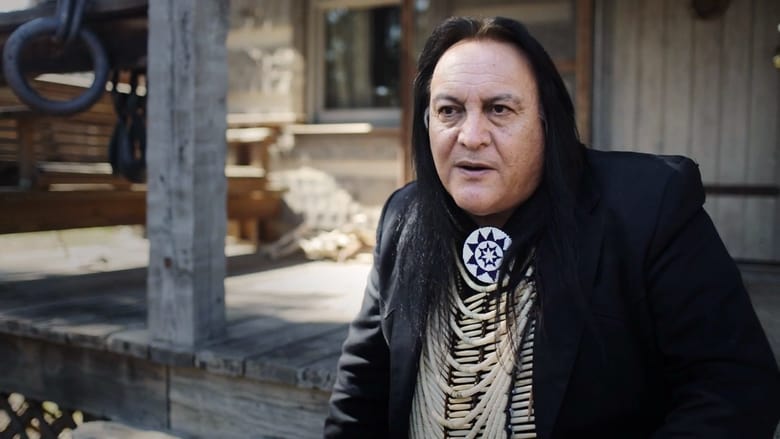A Classic Protest Album Revisited, National Wounds Re-acknowledged.
DIRECTED BY ANTONIO D’AMBROSIO/2015
STREET DATE: AUGUST 21, 2018/KINO LORBER
 As a writer, I find it difficult to avoid using the word “plight” when describing the historic and even current situations of Native Americans. “The plight of the Native Americans…”, a phrase so overused, it’s lost its impact.
As a writer, I find it difficult to avoid using the word “plight” when describing the historic and even current situations of Native Americans. “The plight of the Native Americans…”, a phrase so overused, it’s lost its impact.
Yet, what does it say about us if that phrase can become that legitimately overused? There’s tragedy in that fact alone. One thing is for certain- it means that there are bigger problems in all of this than my own need to find a replacement word for “plight”.
Johnny Cash understood this. A Caucasian man (though he believed himself to have some degree of Cherokee blood) with an inch-deep callous exterior but an empathetic streak deeper and wider than most any, Cash went forward at what could arguably have been the peak of his fame with a concept album devoted to (yes) the plight of the Native American peoples.
In 1964, the notion of “the concept album” had yet to take on the lofty assumptions that landmark rock album brought to the form only a few years later. Meaning, before there was Sgt. Pepper’s, Pet Sounds, Tommy, or Days of Future Passed, there was Bitter Tears: Ballads of the American Indian – an arguably more laser-focused project than any of those, and indisputably weightier in its subject matter. Following the success of “Ring of Fire”, Cash opted to take on over two-hundred years of grotesque injustice committed by the white race against the American Indians. Among the eight incendiary tracks are the Peter La Farge songs, “The Ballad of Ira Hayes”, “Custer”, and “As Long as the Grass Shall Grow”. Cash himself wrote or co-wrote three songs, “Apache Tears”, “The Talking Leaves”, and “The Vanishing Race”. As this documentary points out, Cash paid a price for the project.

Emmylou Harris records in WE’RE STILL HERE.
Filmmaker Antonio D’ambrosio (Let Fury Have the Hour) has crafted an informative and impactful documentary about Bitter Tears, framed around the recording of the 2014 tribute album, Look Again to the Wind: Johnny Cash’s Bitter Tears Revisited. Warmly photographed in Cash’s own cozy recording studio, the cover performances by the esteemed likes of Emmylou Harris, Steve Earle, Gillian Welsh and Dave Rawlings, The Milk Carton Kids, Rhiannon Giddens, and quite notably, Native American musician Bill Miller, among others. All of the above musicians are extensively featured singing their haunting new versions of the original songs. Most are interviewed. And even Cash’s old friend and fellow Highwayman, Kris Kristofferson, is heard singing his contribution. All are clearly putting their all into the effort, the results of which admittedly sound far more appealing than the sometimes dated approach of the source material. It merely proves the new album’s producer correct when he claims that there’s a certain timelessness in the La Farge/Cash songs, just waiting for a contemporary revival.
D’ambrosio is no stranger to the material, as he’s not only executive producer of Look Again to the Wind, but also the author of the 2009 book, A Heartbeat and a Guitar: Johnny Cash and the Making of Bitter Tears. The release of this fifty-three minute documentary presumably brings his multimedia exploration of Cash’s album to a close, a worthy extended effort to be sure.

Bill Miller, interviewed in WE’RE STILL HERE.
Again and again, it’s mentioned how Cash’s career took a blow as a result of the direct, outspoken nature of Bitter Tears. One suspects that Cash might not be thrilled about the degree to which he’s made to be the martyr in this story, particularly as it’s all spring-boarding from the terrible treatment of the Indians- something that continued even in his time. Additionally, the documentary avoids the probable fact that La Farge’s death in 1965 was the result of a Thorazine overdose- a drug that Cash turned him onto.
The true power of the doc lies in the resonant tragedy of the wanton desecration of the Indian way of life. D’ambrosio fortunately understands this, letting Cash more or less argue his own case in the corporate disregard for Bitter Tears in the form of excerpts from an angry letter he publicly put forth to the music industry (read by Steve Earle).

Steve Earle in WE’RE STILL HERE.
The DVD release of We’re Still Here: Johnny Cash’s Bitter Tears Revisited is an entirely passable effort, entirely attributed to its handsome photography and transfer to disc. The music, new and old, is the soundtrack. Much to the filmmaker’s credit, the film stands well alone, as opposed to playing as an extended promo for Cash or, more to the point, the new album that’s shown in progress. The disc extras are inconsequential, but the film, in all its dignity, sells itself.
The real story of Bitter Tears is, of course, the plight of the American Indians. From the modern day flooding and damming (damning?) of a sacred reservation by the U.S. government (an action that President John F. Kennedy did nothing to halt) to the historical relocations and annihilation of numerous tribes, Cash saw and felt the injustice. D’ambrosio’s film, in under an hour, tells these many stories well; simply, yet strikingly.

